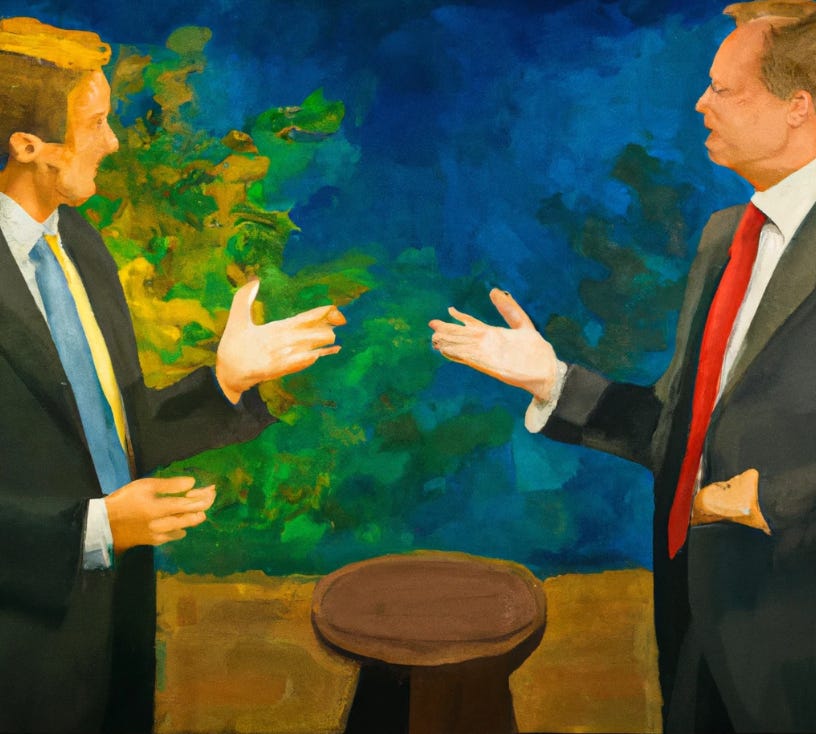In late 2007, a small group of concerned citizens co-founded the nonpartisan, non-profit organization Science Debate. The goal was simple: Science Debate asked presidential candidates running for office to answer science-related policy questions. The idea wasn’t to present them with a quiz about science facts, but rather to hear about their priorities related to issues like competitiveness, space exploration, and pandemic response.
Why? Elected leaders tend to feel strongly tied to the policy commitments they publicly make as candidates. And these commitments play an important agenda-setting role. If presidential candidates addressed science issues along the campaign trail, they should be more likely to arrive in office with a plan for how to deal with timely challenges related to health, technology, and the environment.
Science Debate didn’t begin with the usual suspects. There were two Hollywood screenwriters, Matthew Chapman (who also happens to be the great-great-great grandson of Charles Darwin) and Shawn Lawrence Otto. There was science journalist Chris Mooney, astrophysicist Lawrence Krauss, philosopher Austin Dacey, and me. Soon, science policy expert Michael Halpern and citizen science pioneer Darlene Cavalier joined us.
The founding team was made up of Republicans and Democrats and our inaugural co-chairs were the late Rep. Vern Ehlers (R-MI) and Rep. Rush Holt (D-NJ) - two physicists serving in Congress. Science Debate didn’t advocate for any specific policies or weigh in on candidates’ positions. The purpose was solely to urge the people running for president to share detailed policy plans beyond their signature proposals in stump speeches.
Initially, Science Debate wasn’t meant to become a formal organization. It was a collective public call for then Senators Obama and McCain to address science issues. The same year there had been televised forums on national security and faith. But science topics weren’t mentioned at all in candidate debates or interviews. We felt they deserved time and attention too. So, when we had to file paperwork to become a 501c3 org, we were simply “Science Debate.” That’s all we wanted. A public forum or debate on science so voters would be more informed on Election Day.
The movement was announced in the April 11, 2008 issue of Science magazine. Within two weeks, over 40,000 citizens spanning politics, science, entertainment, business and more signed a pledge supporting the effort. (This was before online petitions were popular and widely circulated). It was the first time in U.S. history that the scientific establishment - the National Academies, The American Association for the Advancement of Science, The Council on Competitiveness, and so many more - unified with a common mission.
Over the next decade, something unprecedented happened. Science Debate successfully persuaded every major presidential candidate to answer a set of pressing science policy questions related to topics like mental health, agriculture, the ocean, and energy. It raised over 2 million dollars of in-kind support to host conferences, events, and discussions to promote science and evidence-based policymaking. President Obama (twice), Senator McCain, Governor Romney, President Trump, Hillary Clinton, Gary Johnson and Jill Stein all shared their science policy positions which were published and distributed widely in print and online by our media partners.
The movement grew and grew. We supported similar efforts in other countries and were eager to help amplify new voices by providing grants and opportunities. When we heard about the idea of a March for Science, we became their formal fiscal sponsor, so a new generation of science advocates could bring their passion and energy into policy discussions in D.C. and around the world. Science Debate chapters sprung up around the U.S. and the org expanded to invite all House, Senate, and Gubernatorial candidates to participate in state organized science policy Q&As.
Last year, I stepped down as director and Science Debate now lives on as a project within the National Science Policy Network, a group that shares a common nonpartisan mission run by emerging leaders in science policy.
I could not be prouder of Science Debate and what a passionate network of motivated volunteers achieved. However, I am also acutely aware that the disconnect between science and decision making in government feels wider than ever.
Efforts like Science Debate make a difference. Science advocacy matters. But it hasn’t been enough. As recent years demonstrated, even a global pandemic didn’t make politicians or regular citizens more supportive of science and research. Rather, many became more dismissive and skeptical of expertise.
Now that my research is focused on the people making policy decisions behind the scenes in Congress, I am developing a different perspective of why science often does not adequately influence legislative outcomes.
So where do we go from here? And how can we achieve science-informed policies that aren’t inherently deemed partisan?
It won’t be easy, but I have a few ideas.







Sheril,
Was this an effort mirroring other knowledge domains (such as education, medicine, economics, etc.)? Or were there aspects you believed were pretty unique to gaining feedback on science related positions?
Did you, or would you have, promoted a presidential debate (or debates for other political contests) focused exclusively on this area. Or perhaps the adversarial nature of debates would not have been helpful?
Welcome Sheril.👍❤️👏🌹🙏